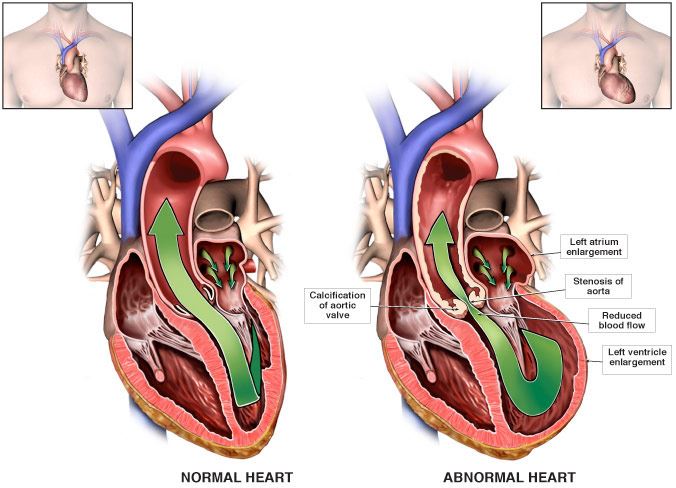Aortic Valve Stenosis
In aortic valve disease, the aortic valve may not be closing properly, which causes blood to leak backward to the left ventricle (regurgitation) or the valve may be narrowed (stenosis). Aortic stenosis (AS) or aortic valve stenosis is a condition in which the aortic valve is narrowed, thus not working properly. This results in less oxygen-rich blood being delivered to the body; thus, making the heart work harder to pump blood, leading to the development of symptoms and/or a weakening of the heart muscle.

Medical Illustration Copyright © 2019 Nucleus Medical Media, All rights reserved.
Types and Causes of Aortic Valve Stenosis
There are two types of aortic stenosis:
- Congenital Aortic Stenosis: A normal aortic valve has three cusps. A child may be born with a valve that only has two cusps (bicuspid), one (unicuspid) or four (quadracuspid) cusps. As a result of this abnormal anatomy, the valve may not open correctly. Symptoms may not appear until adulthood or later in life.
-
Acquired Aortic Stenosis: This type of aortic stenosis is developed at some point throughout your life. It is most commonly caused by calcium build-up, radiation therapy and rheumatic fever.
Symptoms of Aortic Valve Stenosis
There are varying degrees of aortic stenosis. Patients may have a mild, moderate or severe narrowing of the valve. Some patients with aortic stenosis may not experience symptoms for many years. With time, however, patients with severe aortic stenosis may develop symptoms which may include some or all of the following:
- Chest pain
- Shortness of breath
- Fatigue
- Lightheadedness/fainting
- Heart palpitations
- Involuntary weight loss
Diagnosis of Aortic Valve Stenosis
Your doctor will ask you about symptoms and perform a physical examination which will include listening to your heart with a stethoscope to identify a heart murmur (whooshing or swishing sounds). After that, you may also have diagnostic tests and procedures including:
- Electrocardiogram (EKG/ECG)
- Echocardiogram (ECHO)
- Stress test
- Cardiac catheterization
- Computed tomography (CT scan)
- Magnetic resonance imaging (MRI)
Treatment of Aortic Valve Stenosis
Treatment of aortic stenosis depends on the severity of your disease which is determined by signs, symptoms and testing. Based on the findings, your doctor may recommend the following treatment options:
Lifestyle Changes
- Avoid smoking.
- Eat a heart-healthy diet.
- Exercise under directions of your doctor.
- Manage stress.
- Address risk factors for coronary artery disease such as obesity, high blood pressure and high cholesterol.
- Make and keep appointments to see your doctor for routine checkups and follow-up tests.
Medications
- Beta blockers will help reduce your blood pressure.
- Diuretics “water pills” will help reduce the amount of fluid retention in your body.
